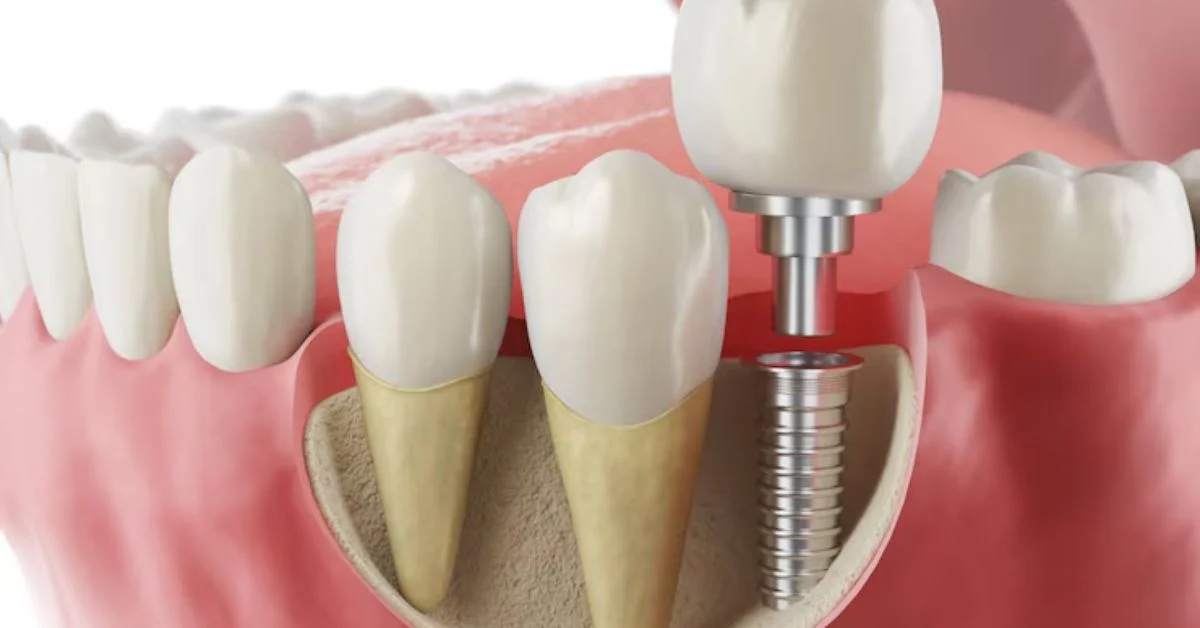The appearance of your smile, your self-esteem, and your capacity to chew and swallow are all negatively impacted when teeth are broken or missing. If you have been avoiding the dentist for some time, you may want to consider getting dental implants now. This article will provide you with all the information you need to make an educated decision about dental implants by covering the 8 telltale indications, supported by professional insights and real-life examples.
What Are Dental Implants?
Titanium posts surgically implanted into the jawbone constitute dental implants, a long-term solution for missing teeth. Supporting crowns, bridges, or dentures, they imitate the appearance of real dental roots.
Unlike traditional dentures, implants:
- Look and feel like real teeth
- Are fixed (non-removable)
- Can last 20+ years with proper care
- Support jawbone health
They’re considered the gold standard in modern tooth replacement dentistry.
Why People Delay Treatment
Despite the benefits, many people delay implants due to:
- Fear of surgery
- Cost concerns
- Misconceptions about pain or complexity
- Lack of visible symptoms
- Belief that “I can live with it a bit longer”
But here’s the reality: early treatment is easier, cheaper, and more effective.
8 Signs That You Need Dental Implants
1. You Have One or More Missing Teeth
This is the most obvious sign.
Whether from trauma, decay, or age, missing teeth create gaps that impact:
- Chewing ability
- Speech
- Jaw alignment
- Smile aesthetics
A dental implant fills the gap and prevents neighboring teeth from shifting.
“I lost a tooth at 32 and ignored it. Two years later, my whole bite was off.” — Mark, Patient
2. Your Dentures Keep Slipping
Do your dentures move when you talk or eat?
This is common with traditional dentures. Dental implants offer:
- Secure anchoring
- No more adhesives
- Natural biting pressure
Implant-supported dentures are especially beneficial for patients tired of constant adjustments and relining.
3. You Avoid Certain Foods
Crunchy apples? Chewy steak? Corn on the cob?
People with missing or loose teeth often:
- Avoid tough or fibrous foods
- Rely on soft diets
- Miss out on nutritional variety
Dental implants restore full chewing ability, allowing a return to normal eating habits.
4. You Have a Severely Cracked or Broken Tooth
Some teeth can’t be saved.
If the root is compromised, a filling or crown won’t help. Instead, your dentist may recommend extraction followed by an implant.
This avoids:
- Chronic pain
- Infection risk
- Further decay
Pro tip: The sooner you replace a lost tooth, the better your jawbone preserves its volume.
5. You’ve Experienced Bone Loss in the Jaw
When a tooth is missing, the underlying bone begins to shrink due to lack of stimulation.
Signs of bone loss include:
- Sunken cheeks
- Loose teeth
- Poor denture fit
- Thinning jaw ridge
Dental implants stimulate bone growth through a process called osseointegration.
6. You Have Infected or Decaying Teeth
If you’re battling repeated infections, root canals, or abscesses, a permanent solution may be necessary.
Dentists often extract the damaged tooth and recommend a dental implant to:
- Prevent future infection
- Improve overall oral health
- Avoid gaps in your smile
7. Your Face Looks Sunken or Aged
Missing teeth can dramatically change facial structure. Signs include:
- Collapsed cheeks
- Wrinkling around the mouth
- Loss of lip support
Dental implants act as structural support and can restore a youthful facial appearance.
8. You Struggle with Speech or Confidence
Tooth loss affects how you speak, especially with front teeth. Common issues:
- Lisping
- Mumbling
- Whistling sounds
Many patients also report lower self-esteem and avoid social interactions.
Dental implants correct these issues, helping you speak clearly and smile confidently again.
What to Expect from the Dental Implant Process
The process involves several phases:
- Consultation and Imaging
- X-rays, scans, and a treatment plan
- Implant Placement Surgery
- Outpatient procedure under local anesthesia
- Healing and Osseointegration
- 3–6 months for the bone to fuse with the implant
- Abutment and Crown Placement
- Final restoration for natural aesthetics
Each step is tailored to your specific needs.
Benefits of Getting Dental Implants Early
Early intervention provides:
- Higher success rates
- Shorter healing times
- Lower risk of bone loss
- Better cosmetic outcomes
- More treatment options (e.g., immediate implants)
Delaying treatment can limit your options and increase overall costs.
Real-World Examples and Testimonials
Patient: Jessica, 41
Issue: Lost molar after extraction
Solution: Single implant
Result: “It feels just like my real tooth. I forget it’s even there.”
Patient: Carlos, 58
Issue: Poor denture fit
Solution: Full-mouth implant-supported dentures
Result: “Now I can eat steak again without worrying they’ll fall out.”
How to Choose the Right Dental Implant Specialist
Not all dentists are implant experts. Look for:
- Board-certified oral surgeons or periodontists
- Clinics with 3D imaging and surgical guides
- Providers offering sedation or anxiety support
- Clinics with transparent pricing and payment plans
- Testimonials and before/after photos
Bonus tip: Ask if they use digital implant planning for greater accuracy.
Conclusion
Do not delay in getting dental implants if you have noticed any of these eight symptoms. Quick action yields superior outcomes, enhanced well-being, and revitalized self-assurance. Dental implants are an investment that will change your life since they are a permanent, realistic way to fix your smile and get your life back on track.
FAQs
1. Are dental implants painful to get?
Implants are placed under local anesthesia and most patients report mild discomfort, similar to a tooth extraction.
2. How long do dental implants last?
With proper care, dental implants can last 20 years or more—many last a lifetime.
3. Can smokers get dental implants?
Yes, but smoking can affect healing and long-term success. A consultation will determine your eligibility.
4. How much do dental implants cost?
Cost varies by location and case complexity. A single implant typically ranges from $3,000 to $5,000.
5. Is there an age limit for dental implants?
No. As long as your jawbone is healthy, implants can be placed in patients from their 20s to 80s+.
For more information, click here.









